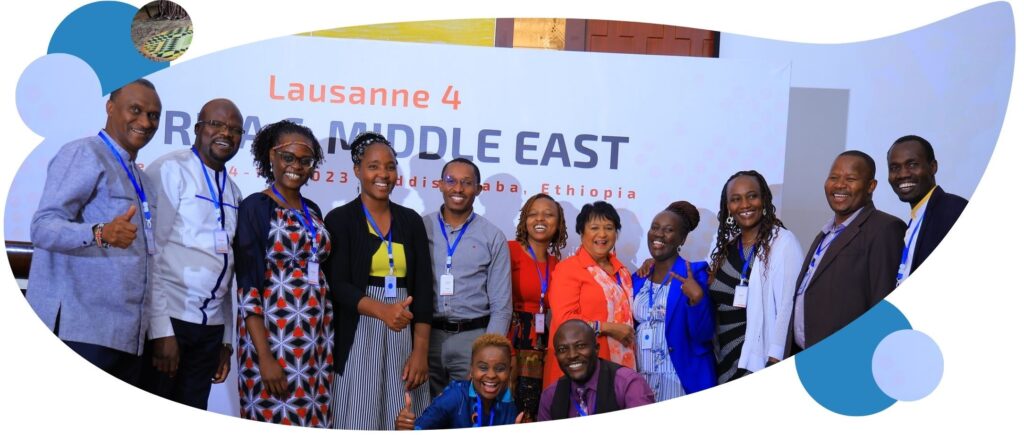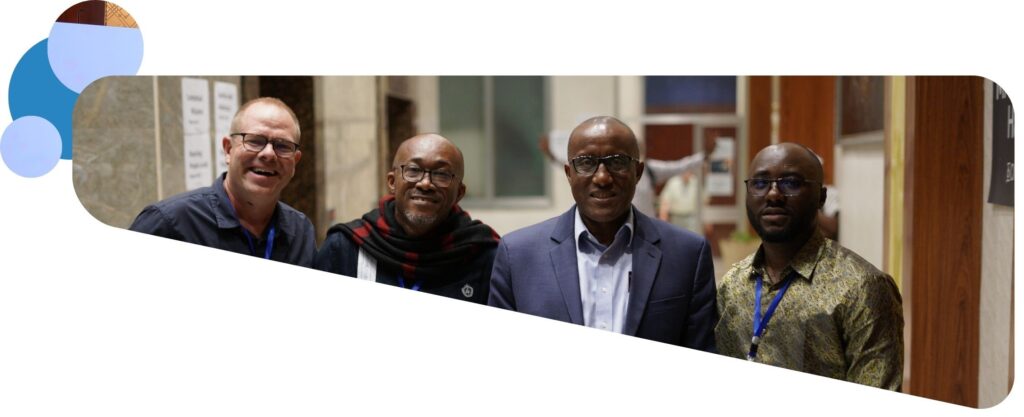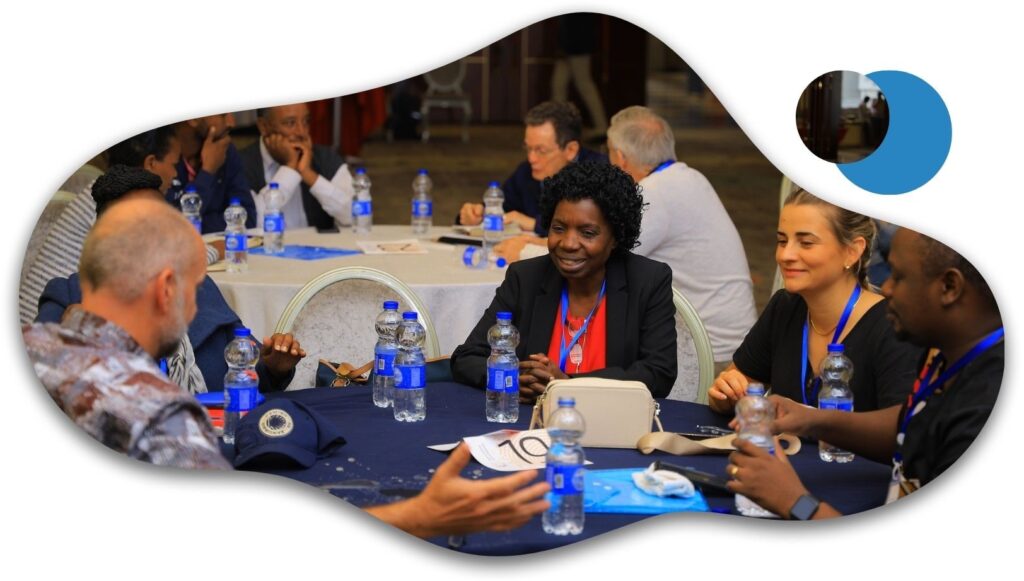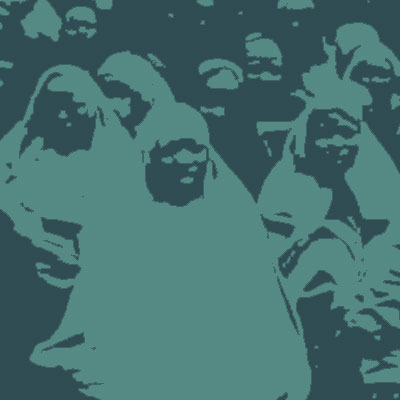Africa became the continent with the most Christians in 2018, surpassing Latin America (which surpassed Europe in 2014). It is tremendously encouraging to see that those who were previously the object of the majority of mission endeavours, have now become the major force behind present-day mission endeavours around the world.
With Christianity’s shift to the Global South, how are African Christian leaders and influencers contributing to global missional strategy?
From 14-17 November 2023, 789 African and Middle East Christian influencers and leaders gathered virtually and onsite in Addis Ababa, Ethiopia, for the Lausanne Africa and Middle East (L4AM) regional gathering. Each day, participants engaged in extended periods of reading God’s Word and worship, plenary sessions, discussion groups and panel discussions, and had opportunities to network.
The purpose of this event was to:
- Engage African and Middle East Christian influencers and leaders in order to bring their voice and contribution onto the global stage of transformative world missions.
- Enable African and Middle East Christian influencers and leaders to learn from one another on the key missional topics.
- Bring together African and Middle East Christian influencers and leaders to build relationships that spark innovation in addressing missional issues.
- Inspire African and Middle East Christian influencers and leaders to collaborate on implementing solutions for missional issues identified by ministry leaders in Africa and the Middle East.

Context of Africa
The African continent now has 1.4 billion people and most of the world’s population growth as we head towards 2050 will be in Africa. It has been predicted that by the year 2050 one quarter of the world, as well as 50 percent of all global evangelicals, will be African.
Like the rest of the world, Africa is becoming increasingly urban, with the rise of megacities like Cairo, Lagos, and Kinshasa. By 2050, the continent is set to have four more: Dar es Salaam in Tanzania, Nairobi in Kenya, Khartoum in Sudan, and Luanda in Angola.
It has been predicted that by the year 2050 one quarter of the world, as well as 50 percent of all global evangelicals, will be African.
Africa has the youngest population in the world. The 25 countries with the lowest median age in Africa are also the countries with the lowest median age worldwide. More than 50 percent of the population in Africa are youth.
Christianity is expanding from Southern Africa, as well as East Africa, yet even more rapid is the expansion of Islam from North and West Africa.
When we consider the demographics and position of the region, the church in Africa and the Middle East will to a large degree shape the future of the global church in 2050.

Gaps and Opportunities
The missional outline and journey of L4AM sought to guide the process from identifying the key missional topics of the Lausanne listening calls in 2021, towards the interactions for the regional gathering of the three Lausanne regions: MENA (Middle East and North Africa), French Africa, and EPSA (English, Portuguese and Spanish Africa).
A selection of topics identified through the listening calls as the most pressing gaps and opportunities in Africa and presented at the gathering are highlighted below.
Peace and Reconciliation in the Middle East and North Africa
Over the course of the twentieth century, the Middle East experienced a host of dramatic political and social challenges, and widespread conflict, contributing to tension within the Middle East and North Africa.
Dr Salim Munayer, MENA network coordinator for the Peace and Reconciliation Network, presented on the challenges in the region due to the breakdown of the state, wage gap, inequality, lack of opportunities for women, and talent drain. The church faces problems of accountability structures that lead to waste of resources and the promotion of political agenda over the gospel.
‘We believe in reconciliation, we teach on reconciliation, but when we come together we cannot be reconciled,’ shared Munayer. ‘We need relationships that lead to justice. We need to define the context and address the imbalance of power.’ Once we find a common purpose, we can establish the grounds for reconciliation, welcoming the other and taking on a new identity found in Christ.
Munayer remains hopeful that the light of God will not be overcome by darkness. In fact, the crises faced in the Middle East region provides a platform for Middle Eastern Christians to speak to the global church and show the light of Christ.‘The presentation of Dr Salim has opened my eyes to the great challenges faced by the church in MENA, in terms of diversity and depth. [Previously]I have just simply seen it as a region that is virtually closed to the gospel of Jesus Christ. The issues the church in the region is facing have really been opened to me! I am so grateful for the presentation!’ —Esther Gonda, L4AM virtual participant
Supporting the persecuted church
Gideon Para-Mallam, Lausanne Catalyst for Leadership Development, presented on the ‘Mission Context of the Persecuted Church in Africa and the Imperative of Peacebuilding’.
Christians across Africa suffer persecution in varying degrees: Some experience structural and systemic discrimination. Others suffer frontal attacks and outright terrorism. Here are some statistics shared on persecution of Christians in Africa:
- Open Doors World Watch List Report of 2023: 1 in 5 believers across Africa live in nations with high levels of persecution or discrimination.
- Eleven (11) of the top 20 countries on the 2023 Global Terrorism Index are African countries.
- 16,865 Christians were martyred between October 2019 and September 2023.
This is our missional reality on the African continent and it may not be ending anytime soon. God works through persecution—it was under communist rule in Ethiopia that the church there exploded.
Let’s celebrate the work that God is doing in Africa despite and even through persecution and continue praying for our brothers and sisters who are experiencing persecution right now.
Article
Pray with Us: Nigeria’s Captive Girls
Nigeria is one of the most difficult places in the world to be a Christian. Boko Haram and other terrorist groups, armed robbers, and the Fulani herdsmen have all targeted Christians in recent years through acts of brutality, kidnapping, and murder. One demographic that has been repeatedly targeted is young Christian women.
Engaging younger generations
Delphine Fanfon, CEO for Me4real International, addressed the mentoring gap for emerging leaders in Africa. This shortage of healthy mentoring relationships robs the bride of Christ of the treasure needed for one generation to build on the work of the former generation. Closing the gap is a call that God extends to every Christian leader (1 John 2:12-14).
Fanfon presented three necessary shifts that need to take place in our approach to mentoring the next generation of leaders for strategic missional influence:
- Shift from a transactional relationship to a trip, by placing the focus on the relationship.
- Shift from potential to destiny, by seeking to discern God’s call upon the mentee.
- Shift from people-pleasing to God-pleasing, through both parties growing in authenticity by the Spirit.
The book of Acts guided us as we processed missional opportunities and challenges in Africa and the Middle East in eight affinity groups. Transformational disciple-making and whole-life mentoring surfaced as needs across the groups, and Delphine did an incredible job of helping us frame this in her presentation on mentoring. —Ole-Magnus Olafsrud, L4AM participant
Mission Strategy: Involving Women in Ministry
Lilian Dodzo, World Vision regional leader for East Africa, spoke on the strategic importance of women and children as a mission target and mission force in Africa.
Women and children form the majority populations in Africa, with over 50 percent of the population being children. Women and children are most easily reached, discipled, and most likely to share their faith, making them a strategic missional target and mission force. They are the demographic driving discipleship in the church. Women and children have always been at the forefront of transformational mission in Africa and beyond, and across churches today, the majority congregants are women and children. This is especially true in Africa.
Women and children are most easily reached, discipled, and most likely to share their faith, making them a strategic missional target and mission force. They are the demographic driving discipleship in the church.
As a young person listening to this, it is very encouraging to see a focus on younger generations and the future of ministry in our region. —Trivina Kassis, L4AM virtual participant
Likewise in the Middle East, one of the presenters shared how women are making a difference in Saudi Arabia, through their relationships with other women, through raising their children, and through the opportunities they have in the homes of people in Saudi Arabia.
Despite the progress made in the last decades, women and children remain excluded and discriminated against in mainstream ministry. They are also most vulnerable to the effects of disaster, often bearing the heaviest burden during conflict, poverty, and other challenges.
Let us continue to pray for the women in Africa and the Middle East.

Listening to God
Wrapping up the gathering, Stephen Mbogo and Esther Chengo shared a renewed vision for the Lausanne regions in Africa and the Middle East, involving issue affinities, regions, generational mentoring and introducing the Africa and Middle East Leadership Forum (AMLF) Regional engagement.
It was so great to see so many old and new friends at the Lausanne 4 regional gathering for Africa and the Middle East this week. My heart is full, and my mind has so much to process. God is working powerfully across the continent of Africa, and we in the West have so much to learn. —Attila Nyári, L4AM participant
Dr Tite Tienou, research professor of Theology of Mission, Trinity Evangelical Divinity School, reminded participants, ‘We will accomplish the missional responsibilities of our time if we commit ourselves to listening to God in obedience.’
Let us listen to one another as we engage in mission through the Spirit of God to and through Africa and the Middle East to the world, but more importantly, let us place ourselves in a humble posture of listening to God. May God bless Africa and the Middle East.


